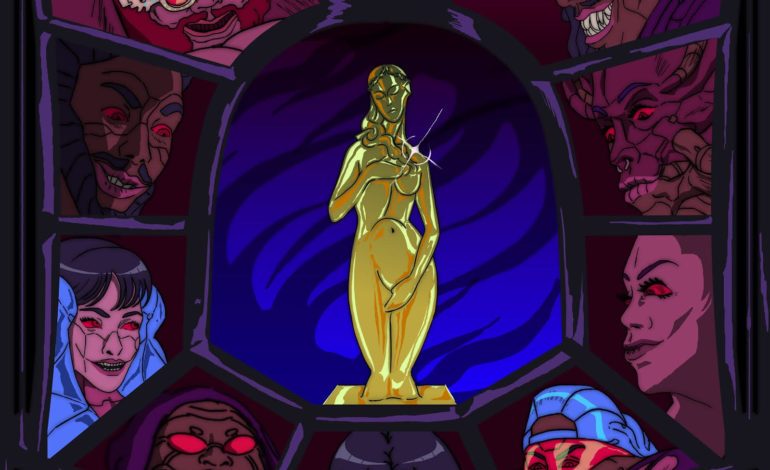

An Aggressive Venture into Freedom
Around the beginning of the 2010s, Kimbra swung into the hearts of American radio listeners with her feature on the moody and timeless track Gotye’s “Somebody That I Used to Know.” She rode the waves of fame through the seas, but those waves of toil hadn’t held her captive in any way. She’s grown herself as an artist. In 2024, she released her alternative-hanging album, Idols & Vices (Vol. 1). The album reflects her glorious grip on her vivacious independence as a creator.
Kimbra immediately places the entire album in a promising position with “Right To The Head (Intro).” Including the song in the first-place spot on the track list helps listeners involuntarily allow the exact action described in its title to occur. She stands alone in it, its singer, and therefore, room for ebullient ethereality is established, but it remains playful and could be though silly, the music for a drive over Rainbow Road. There isn’t much motion in it, but simultaneously so much, contradictory as it may sound.
All starts to make sense again with its leading follower, “Demi God (feat. Sahtyre).” Lots of independence exists in Idols & Vices (Vol. 1). It feels uniquely emancipatory for one person, Kimbra, as there’s this sense of wanting to free oneself from all things and nothing that permeates every last second of the music. “Demi God (feat. Sahtyre)” is where the album’s first feature appears, and he’s got that mocking rap flow going halfway through the song, almost questioning his singing as he does it. But the salt-shaker synths compliment Kimbra’s flavorful voice, enhancing its potency. The boldness and fearlessness reveal her extreme confidence, and that’ll put any audience at ease because it welcomes them to fully come to trust whatever art they’re ingesting—a challenging task, to say the least.
There’s no faltering in Kimbra’s voice on Idols & Vices (Vol. 1). “Force Field (feat. Sahtyre)” brings more of a hip-hop sound to the forefront. Yet Kimbra’s vocals are always soft and gentle, bringing about the development, then, of this interesting juxtaposition. In that case, the third track is also liberating and outros out with a water-falling sound, the audio of a robot’s vomiting following. Then, “Back To You” bears an outstanding balance of this perfect, energetic combination of frustration and liberation. It has that don’t-look-back vibe; on this one, the jazz club meets that forever-saddening scenario in movies that end with two lovers separating in the rain.
What comes next—specifically, “Stuff I Don’t Need (feat. BANKS),” “I Wonder (feat. Ivy Sole),” and “Ride Or Die (feat. Tommy Raps)”—is a massive declaration of independence of sorts. “Stuff I Don’t Need (feat. BANKS)” is reflective, and Kimbra seems to be evaluating something, attempting to teach that sometimes that which gets to be overmuch can get anybody down to the depths of the worst ruin. Still, she’s liberated, however, somehow, whether through her lyrical wit or vocal power. “I Wonder (feat. Ivy Sole)” is a journey in its own way. It invites one to lie down on a staticky rug in a field on some plains, quiet under a starry sky, the tapestry of the twinkling stars above telling the stories, asking the questions, and singing the songs. It’s star-slow—in other words, still as a star yet nevertheless beautiful. Its outro solidifies the reality that all the outros on the album are their creative entities, creeping up positively.
Finally, “Ride Or Die (feat. Tommy Raps)” just makes one want to listen to it, getting all attention. It emphasizes the effect of this progress that’s been made over time—themes of moving on and growing up dominating. If Katrina and the Waves’ timeless hit, “Walking on Sunshine,” sang its song, it’d sound something like this. The meditation on the good vibes it presents is executed professionally and maturely, as Kimbra does, and the crazy sound of the outro is redolent of an old video game’s loading screen, or it could just be an arcade machine’s voice disguised after all these years of being dormant.
“Honeycomb (feat. Candy Crush Saga)” and “RNTBCK (feat. Sahtyre)” arrive later. “Honeycomb” is jazzy and could be played for those wishing to dance away carelessly in the jungle. It seems to be something Shakira or Lady Gaga could’ve sung had they been given the production. Too much attention’s taken away from Kimbra on “RNTBCK (feat. Sahtyre),” so it marks itself as the weakest on the album.
Idols & Vices (Vol. 1) demonstrates Kimbra’s versatility and transformation as a confident artist over the past decade. She’s a ticking clock, the very passage of time and momentary all at once, accentuating her flexibility and the extent of her capabilities.
“The Moment (feat. Dawn Richard)” has the singing-snapping feel to it, since it’s that track people can sing along to, snapping their fingers and gently moving their heads from side to side as they do so. The garage-band-sounding outro is the proper cherry to have on top, as well. “Stay Strong” is the closer, and works with that credits-are-rollin’ independence. Kimbra sings, “I’ve been spending time with my regrets/They prey on me when I’m not with my friends.” While that line might contain and exhibit a sense of dependence, there’s ultimately encouragement and empowerment galore in independence in Idols & Vices (Vol. 1) that shouldn’t be overlooked.
